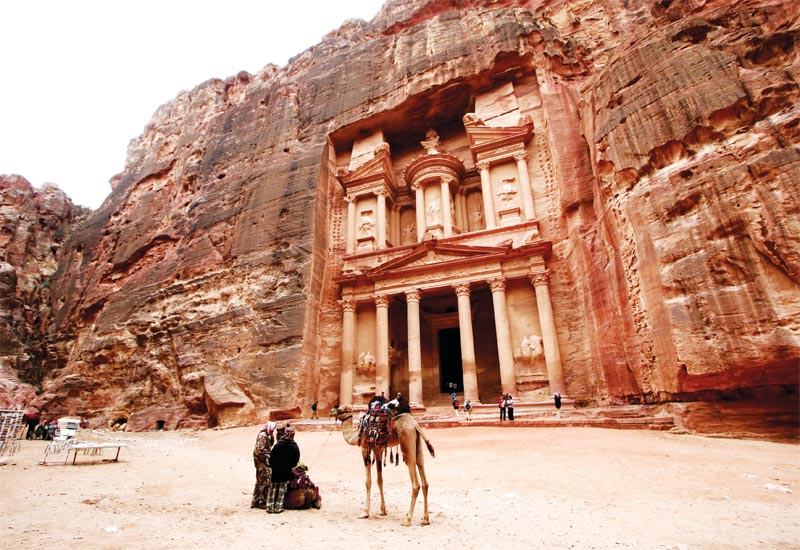His Excellency Nayef Hmeidi Al-Fayez, Minister of Tourism & Antiquities for Jordan, tells Louise Oakley why he is confident in the tremendous growth potential for Jordan’s tourism industry
The year 2012 will be a “milestone” year for Jordan’s tourism industry, according to His Excellency Nayef Hmeidi Al-Fayez, the country’s new Minister of Tourism & Antiquities.
Speaking to Hotelier Middle East at the World Travel Market in London, Al Fayez revealed that the Kingdom will be celebrating the 200th anniversary of the rediscovery of the Lost City of Petra in 2012 — and that the Ministry plans to capitalise on this in a big way.
An UNESCO World Heritage site, Petra is already Jordan’s greatest tourist attraction. Being named one of the controversial New Seven Wonders of the World in 2007 helped boost its international reputation, and now, says Al-Fayez, interest needs to be reignited and transferred across the entire country.

| Advertisement |
“We got the attention of people on Jordan as a destination [in 2007] but they think of Jordan as Petra,” he says. “We are reinforcing the issue of Petra on people with the 200th anniversary, and we’re using it as a gateway to the treasures of Jordan.”
Even when it comes to Petra, Al-Fayez says people don’t realise how much there is to see and do; the famous pictures of the 1km-long gorge, the Siq, and the Al-Khazneh (The Treasury) are just the first elements of a Petra experience which can take four-five days to discover.
“You go through the Siq and you see this big Indiana Jones-style Treasury but Petra is beyond that. Petra is a whole city.
“Jordan is beyond Petra, is beyond the Dead Sea, it’s a different experience rich in history and culture,” says Al-Fayez, who refers to the country as an open-air museum.
The Dead Sea too suffers from misconceptions, he continues, and the Ministry is focused on developing the area as a destination.
It reinforced efforts to promote the Dead Sea with its nomination as one of the New Seven Wonders of Nature and although it didn’t make the final seven announced last November, the campaign has still helped raise its profile.
“When someone comes out of surgery, they are given extra oxygen to make them stronger and help them recover; at the Dead Sea you get this naturally and no one understands this until it is explained to them,” says Al-Fayez. “It has the highest oxygen levels that exist anywhere because it’s the lowest point on earth.
“It has benefits of luxury spa and cosmetic elements that are good for your skin, for your soul and for your health and also for treatment, so the focus is on that. We recently launched our masterplan for the development of the Dead Sea. It involves more hotels, more facilities, more entertainment, more restaurants — all these supporting elements. The Dead Sea is becoming a tourist attraction and it’s becoming a destination,” he asserts.
Still, Al-Fayez is keen to emphasise that Jordan has a lot more to offer beyond Petra and the Dead Sea. The country has always been known as a tourism destination, but has faced challenges because of the slow development of tourism infrastructure, which only really began around eight years ago, he says.
“There is the same issue with Aqaba [as with the Dead Sea],” said Al-Fayez, “in terms of where it is today and where it should be or where it’s going.
“Aqaba is another area where we’re seeing a lot of infrastructure and facilities. We have multi-billion dollar infrastructure being put in place in Aqaba,” says Al-Fayez, referring to the US $1.5 billion Star-Trek-themed Red Sea Astrarium Resort being developed by Rubicon Group Holding. Construction on the resort is expected to begin in March, with the opening scheduled for 2014.
Ultimately, the aim is make sure international travellers are as familiar with places such as Aqaba and the capital, Amman, as they are Petra and increasingly, the Dead Sea. Fortunately, despite the Arab Spring, Al-Fayez believes there is confidence in Jordan as a calm and safe destination but that more education is needed as to what Jordan offers —as well as history and culture, there is “religion and faith, fun and adventure, eco and nature, and MICE and conferences”.
“I think Jordan remains to be the oasis of peace and stability throughout — what we tried to do is differentiate to make sure that when people look at Jordan they look at Jordan alone. You cannot take a region and say the Middle East – the Middle East is 22 countries.
“I think Jordan has tremendous potential, we got very positive feedback throughout 2011, despite the Arab spring,” says Al-Fayez.
Article continues on next page …









 Search our database of more than 2,700 industry companies
Search our database of more than 2,700 industry companies










Jan 24, 2012 , Jordan
Your Excellency, you are doing a great effort to an important & vital Ministry that you are leading. We are confident that our beloved Jordan & its economy will acquire these benefits. Wish you all the success , and God Bless you Abdel-Kader Muhtadie Hospitality Consultant